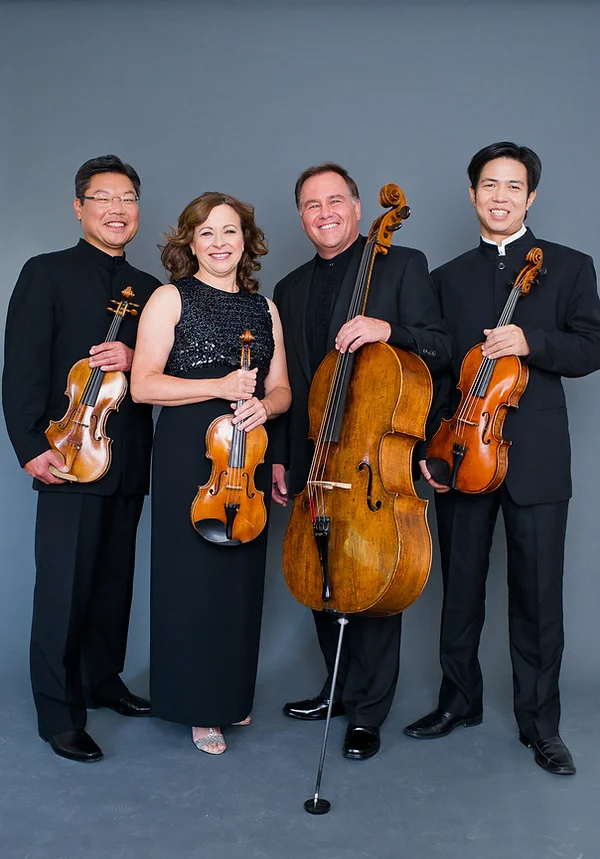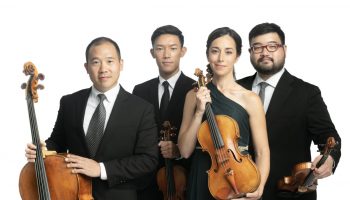
Miami String Quartet hopes to offer a “fresh perspective” through the chamber group’s repertoire, said first violinist Benny Kim, with newer, 20th-century music the audience may never have heard before.
Formed in 1988, the Miami String Quartet has gathered much prestige and a long list of awards in the ensuing years; some include the Cleveland Quartet Award presented by Chamber Music America, first prize in the Concert Artists Guild competition, and Grand Prize of the Fischoff Chamber Music competition.
The Miami String Quartet — violinists Kim and Cathy Meng Robinson, violist Scott Lee, and cellist Brandon Vamos — is set to perform at 4:15 p.m. today in Elizabeth S. Lenna Hall as part of the Chautauqua Chamber Music Guest Artist Series.
Although their regular cellist Keith Robinson has fallen ill — doing well, but unable to play — Miami String Quartet will play with the son of Kim’s former teacher, Almita Vamos. None of the quartet’s musicians have been to Chautauqua, but since Vamos is a long-time faculty member with the Chautauqua School of Music, the musicians are all well aware of what a “magical place” Chautauqua is, Kim said.
The planned program is unusual in a sense, Kim said, as the first half is mostly 20th-century music and the second half is going to be mostly 19th-century music, so “we’re going backwards in time — the program is really, really awesome.” Diverse programming is important to the quartet and much of the time their programs are made up of newer music.
The program for this afternoon’s recital will be Samuel Barber’s String Quartet in B minor, Op. 11; Erwin Schulhoff’s Five Pieces for String Quartet; and Felix Mendelssohn’s String Quartet No. 6, Op. 80 in F minor. In playing classics like Mozart or Beethoven, “you inevitably get compared, but in new(er) music, you have a fresh voice for things,” Kim said.
Barber composed his String Quartet in B minor at 26 years old, and he continued to revise it until about the age of 33. Mendelssohn’s older sister died unexpectedly at 41 in May 1847 and he completed No.6 Op. 80 in that September; the anguish and grief adds a deeply personal edge to the sound.
“A lot of times it’s the music that chooses us,” Kim said. “Sometimes we get commissioned by composers or organizations who have composers in mind for them to write us a piece. It varies, but we enjoy playing new music, for sure. One of the great things about playing new music is that when you’re the first one to play something, you’re the best ones to play it.”
Kim was a soloist before joining the quartet back in 2008. He stepped in for another musician who had been injured and unable to play; when that musician’s temporary absence turned into a permanent one, Kim stayed on with the quartet. There’s a great deal more responsibility in playing in a chamber quartet, opposed to playing solo, Kim said.
“If I screw up, or if anybody screws up in the group, they have the ability to take the entire group down,” Kim said. “The string quartet is a completely different beast than solo playing; it’s not nearly as spontaneous, because you rehearse like crazy to make sure that it sounds a particular way. You don’t want to rock the boat and deviate from that. When it’s good, it’s really, really awesome.”
What makes the Miami String Quartet special, Kim said, is the musicians’ “long friendship and our camaraderie.” And for Kim, like any musician, what makes him so passionate about playing the violin is the ability to create.
“Projecting things that are on paper — these days on iPads — and creating moods, feelings and expressions is something that you just can’t do any other way,” Kim said. “There are many art forms, and this is one of our ways of expressing things, but you can really move people with music if you are able. We’re able to do that quite a bit, and it makes playing a great pleasure.”
In projecting those moods, feelings and emotions, Kim emphasized the importance of allowing oneself to be vulnerable. In order to project that to the audience, “you must have that ability to express your feelings and your emotions.”




